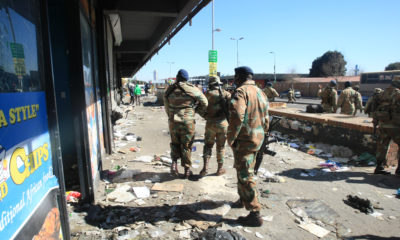
OpEds

Unstable world often ends badly for Jews
The past few weeks have again shown how unstable the world has become, with unpredictable incidents occurring across the globe.
Disputed elections in Venezuela
A fiercely contested election was held recently in Venezuela. On Friday 2 August,, the electoral commission stated that after processing 96.87% of the votes, the incumbent, President Nicolas Maduro, had obtained 51.95% of the votes while opposition candidate Edmundo González got only 43.18%. It didn’t make public the data that supports this, and has yet to do so. The opposition has released credible and detailed data from the election showing that it won 67% of the vote, with the incumbent reaching only 30%. Not surprisingly, Venezuela’s opposition and multiple Latin American leaders have refused to recognise Maduro’s victory; nor has the United States or the European Union. In fact, the US said it would recognise González as the winner. At least 11 people have been killed in the protests against the election results, according to non-governmental organisations, and Venezuelan authorities say that more than 1 000 people have been detained. This story still has a way to run, but instability and violence appear likely to continue.
Race riots across Britain
On 29 July, three young girls were killed in Southport in the north of England. Fuelled by fake online news that an illegal immigrant was responsible, anti-immigration protests then flared across towns and cities in England and Northern Ireland. Mosques and police officers were attacked. In Rotherham, a mob tried to set fire to a hotel they thought was housing asylum-seekers. Police arrested more than 150 people that weekend. As The Economist put it, some of the worst race riots since World War II hardly fit the image of a newly stable Britain, so sought by the incoming Labour government with its new huge parliamentary majority. Prime Minister Keir Starmer held his third emergency meeting of the week on Friday, and told ministers and police chiefs to “remain on high alert” to the threat of further rioting across England and Northern Ireland. Almost 500 rioters have been arrested so far. Countries like Nigeria and Kenya have even issued travel advisory notices, warning their citizens planning to travel to the UK that there is an increased risk of violence. All this in one of the world’s oldest and most stable democracies!
Fall of Bangladesh’s leader
On 5 August, Sheikh Hasina, Bangladesh’s prime minister, resigned and fled the country following weeks of violent protests against a job quota scheme. What was so surprising about this was that she had ruled the country with an iron grip since 2009 and looked unassailable and invulnerable. She was relatively quickly driven out by a massive example of people power on the streets of Dhaka, much to the surprise of Bangladesh’s neighbours, who seemed unsure how to react initially.
Africa isn’t immune
Instability also broke out in two of Africa’s most important countries: Kenya and Nigeria. Protests in Nigeria began over the soaring cost of living, with hundreds of thousands of people taking to the streets in the capital, Abuja, in Lagos, and other big cities, marching against economic hardship and crime. The protests eventually ebbed only on Monday 7 August, following a crackdown by security forces, with Amnesty International saying that at least 13 people had been killed in clashes with police since the start of the protests. Police put the death toll at seven.
This follows ongoing protests in Kenya, where young people returned to the capital’s streets for an eighth week of demonstrations on Thursday 8 August, as the president swore in a new Cabinet. Police fired tear gas at protesters in the Nairobi city centre as many businesses remained closed. The demonstrations started nearly two months ago, organised mostly by young Kenyans against unpopular proposed tax increases that were imposed to reduce the budget deficit. They persisted as more citizens joined the largely leaderless, social-media-organised movement against corruption and the high cost of living. At least 61 people have been killed in the protests nationwide, according to the Kenya National Commission on Human Rights.
Things are likely to get more wobbly and unbalanced as we race to the end of the year. There is, of course, a US election in November, with two candidates who hold radically different views about where they want to take the US. There has already been an attempted assassination attempt on one candidate, and to say the US is bitterly divided politically is putting it mildly. The wars in the Middle East and Ukraine continue unabated, as does the civil war in Myanmar. France still isn’t sure who will lead the new government that has to be formed after the Olympics, nor what the ruling coalition will look like, after no party came close to securing a majority in their recent elections.
This is just to mention a few hot spots. There are many more. We should all buckle up and hold on tight as we’re on a wild ride into 2025!
Unfortunately, we Jews have seen this movie before. Throughout history, as soon as the world goes through an unstable and unbalanced phase, with extremists on the hard left and hard right gaining power, it generally ends badly for the Jews – and other vulnerable minorities. The 1930s are a good example. Let’s hope this time it’s different, but as the old saying goes, the more things change, the more they stay the same!
Harry Joffe is a Johannesburg tax and trust attorney.











Jessica
August 17, 2024 at 7:54 pm
Actually, it’s only the mainstream media’s fake news about ‘extremist far right populism” that obscures the fact that it’s mainly a worldwide centrist backlash against wokery.
And as we are now experiencing, that same wokery is at present cozy bedfellows with perhaps the most barbaric antisemitism the world has ever witnessed.